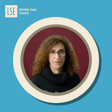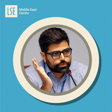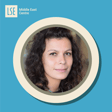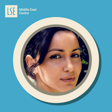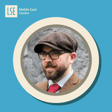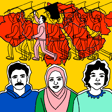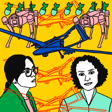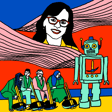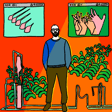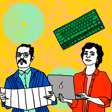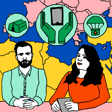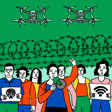Become a Creator today!Start creating today - Share your story with the world!
Start for free
00:00:00
00:00:01

Episode 8: Nicola Pratt on Ethics and the Responsibility to Counter Repression
In this last episode of the series, Anne Kirstine speaks to Nicola Pratt about her views on the role of researchers in society. Nicola reflects on the ethical responsibilities of researchers to fight repression and the importance of engaging in political debates about their subject matter. She also reflects on the importance of relations in a time where extractivism has become a widespread research method.
Nicola is Professor of International Politics of the Middle East at the University of Warwick. Her publications have explored women's activism, democratisation, human rights and conflict in a number of Middle Eastern countries.
Transcript
Introduction to Positionality and Guests
00:00:03
Speaker
Hello and welcome to Conversations on Positionality, a podcast brought to you by the LSE Middle East Centre.
00:00:10
Speaker
My name is Anne Kirsten Rohn. I'm a visiting fellow at the centre, and you're listening to episode 8 of this podcast series, which explores how who we are as researchers shapes the work we do. In my own work, I often travel to contexts different from the one I grew up in, and talk to people whose lives differ significantly from mine. And that has made me think a lot about how my nationality, gender, age, and personality play out in my relations with people in the field.
00:00:39
Speaker
It has also made me wonder how we as researchers can strengthen the awareness about positionality amongst ourselves and within our academic institutions.
Nicola Pratt's Research on Geopolitics
00:00:49
Speaker
In today's episode, I've invited Nicola Pratt to discuss these and more questions with me.
00:00:55
Speaker
Nicola is Professor of International Politics of the Middle East at the University of Warwick. Her research is situated at the intersection between politics of the Middle East and feminist international relations theory, and her publications have explored women's activism, human rights and conflict in a number of Middle Eastern countries.
00:01:16
Speaker
Her latest book, Embodying Geopolitics, Generations of Women's Activism in Egypt, Jordan and Lebanon, was published with the University of California Press in 2020 and is based on over a hundred extensive personal narratives from women of different generations in these countries. And I'm very excited to talk to her about these interviews and how she went about her fieldwork. But for now, I want to say welcome to you, Nicola. Thank you for being on the podcast. Thank you and thank you for inviting me.
Impact of Gaza Conflict and Academic Responsibility
00:01:46
Speaker
So the previous episodes of this podcast have all been recorded before October 7 and now we're sitting on November 17 after Hamas's attack on Israel and whilst Israel's bombings continue to kill civilians and destroy homes in Gaza. So the question we need to start with I think
00:02:07
Speaker
in this podcast episode must be about what has unfolded since October 7. And what I'd like to ask you is how these events, how these atrocities have made you reflect on the issue of positionality.
00:02:23
Speaker
Yeah, I mean, what's happening in Gaza is heartbreaking. I don't have enough words, really, to fully describe how I feel. Gaza is always on my mind these days. I think that these moments of crisis really make me think about what is the point of what we do as academics.
00:02:52
Speaker
I think it's really brought home the importance of thinking how our research relates to dominant systems of oppression and violence. And as researchers, what can we do to try and dismantle those systems of oppression and violence that are enabling Israel to pursue this horrific
00:03:19
Speaker
campaign and violence against Palestinians in the Gaza Strip, as well as the violence that it's also conducting in the West Bank.
Universities and Global Conflict Complicity
00:03:28
Speaker
For most of us it's going to relate to the content of our research, you know, the sorts of research questions that we ask and the methodologies that we use.
00:03:38
Speaker
It's also about the wider infrastructure in which we do our research. Most of us working in universities, those universities have links with arms companies that are selling weapons to Israel. Some might even have joint research on security or military related matters with universities in Israel and, you know, not just myself, but
00:04:07
Speaker
My colleagues and students in particular are very much concerned about the sort of complicity that universities have with the violence that's currently happening in Gaza.
00:04:18
Speaker
I think what you say speaks to topic that I've been discussing with several guests on this podcast already. And that is the fact that positionality is so much wider than just who we are in the field and our relationships with our interlocutors.
Researchers' Societal Roles and Positionality
00:04:35
Speaker
Positionality is also who we are as researchers in society. And I think that right now is a very important debate.
00:04:43
Speaker
So I'd like to ask you, how do you see your role as a researcher in society? What are the opportunities and limitations perhaps that come with having your particular positionality within the academic sphere and within the public debate? Yeah, that's a really good question. So when I think about positionality, I think it's about locating yourself within these systems of oppression.
00:05:09
Speaker
So not merely about being able to describe yourself in terms of your gender or your class or your race, but rather resisting or being reflective of the privileges that come with that.
00:05:28
Speaker
And I think we shouldn't think about positionality in a very static way. It's something that will change depending on context and types of research that you're doing and the subject matter of the research.
Challenges in Research Due to Identity
00:05:42
Speaker
For example, when I did research on the impact of the USM invasion of Iraq on women and gender with Nadia Ali, who's now a professor at Brown University.
00:05:56
Speaker
We thought a lot about positionality because of being perceived differently as well as having different backgrounds and how that impacted upon our interactions with the people that we were interviewing.
00:06:12
Speaker
You know, I've always been involved in social justice movements of one kind. But when somebody meets me for the first time, they don't know anything about my longer history. So they take me very much based on what I look like. So when we were working on the book on Iraq, I interviewed quite a lot of people in the US State Department. And there was almost like
00:06:39
Speaker
I guess an assumption because I was British and Britain was an ally and I was white that somehow I was sort of on the same page as them. It was difficult to listen to but I guess it meant that they trusted me in a way that maybe they wouldn't have done if they really knew who I was.
00:07:01
Speaker
Yes, I wanted to ask you if you could give an example of how that came to show in your interviews, that perception they had of you. Yeah, so I actually thought it would be quite difficult to get interviews with people in the US government to talk about what they were doing in Iraq.
00:07:16
Speaker
And to some degree, maybe it's also about the topic of the research, right? So we were researching the impact of the US debt invasion on women and gender. And the US officials thought they had a really nice story to tell about how they were saving women in Iraq, right? And they wanted to tell that story. But perhaps, yeah, if I had been researching the US counterinsurgency operations, that might have been a completely different kettle of fish.
00:07:44
Speaker
In other circumstances, definitely being a white researcher from a Western-based university has led people to say no or even not respond when I've asked them for interviews. So I did have some experiences of that when I was researching my last book and contacting different women activists for interviews.
00:08:06
Speaker
On the whole, I got positive responses, but a couple of occasions people cited my background as a researcher from a Western-based university as why they wouldn't want to speak to me. What were they concerned about regarding your background? Do you know?
Ethics and Responsibilities in Research
00:08:24
Speaker
So in one case, there was no further elaboration. In another case, actually, they gave a, what I actually thought was a really good justification. This was in Pojibarajne refugee camp, and the person said, you know, like these researchers, they come here all the time. For years and years, I've been speaking to researchers coming from Europe, from North America.
00:08:50
Speaker
What did their research do to make our lives better? And I thought, you know what, actually, that's spot on. I mean, going back to what we started talking about at the beginning, about the importance of making sure that our research tries to dismantle and challenge systems of oppression in the interest of improving the lives, particularly of the most precarious people like refugees, people living in conflict zones.
00:09:19
Speaker
So there's been an increasing awareness in the last decade or so of extractivism as a model of research, taking up people's time, interviewing them for research that will benefit you as an individual academic. You'll get promoted, but these people will still find themselves in exactly the same situation. Because I also recognise that sometimes the impact that research can have takes a long time.
00:09:48
Speaker
Especially, you know, when you're trying to sort of challenge dominant paradigms that doesn't happen overnight. That's why it's really crucial not just to see the Middle East as this laboratory or this, you know, field workplace where you go and you do your research, but it, you know, you have also an ethical, I think, responsibility to speak up more politically
00:10:15
Speaker
So it's not just about the research that you produce, it's about taking political stands, about opposing policies of your own government that may be contributing to the suffering of people in other parts of the world. Certainly, you know, as a UK citizen where our government is wholeheartedly supporting Israel's war crimes, I think
00:10:40
Speaker
It's absolutely an ethical duty to oppose that, whether that's through joining protest movements or through other types of action. I think that researchers have a responsibility that goes beyond just the immediate production of knowledge, but also to stand in solidarity with people, especially when you've actually met those people and they've taken time
00:11:09
Speaker
out of their schedule to meet with you to help you with your research.
Trust-Building and Long-Term Research Engagement
00:11:14
Speaker
Yeah but I was wondering like you said it's often hard to predict the impact of one's research. It might only come to show many years after and it depends on how it's been received also by different communities that it seeks to target. So what do you do in practice when you're in the field? How do you
00:11:34
Speaker
On the one hand, show solidarity and show your intention to make your research have an impact, while at the same time not promising too much, leaving your interlocutors with a feeling that their lives might change due to the research.
00:11:51
Speaker
Yeah, I think you just have to be honest. And then people can make a decision, you know, it's within their right to say, sorry, I don't have the time to spend on this. This is not my priority. It goes back to like one of the very, you know, sort of core principles of ethical research, which is informed consent.
00:12:08
Speaker
I think what's really important is building trust with people, which you can only do over a longer period of time. You can't do that if you're just going into the field for a couple of weeks. When people have an opportunity to get to know you, it's a lot easier for them to have confidence. Should I trust this person with telling them my story?
00:12:34
Speaker
That was the thing that enabled me to do the research from my last book that I had spent many years visiting the Middle East, especially those three countries, Egypt, Jordan, Lebanon. And even if the people I interviewed were not my friends, they were friends of friends or friends of friends of friends.
00:12:56
Speaker
that really was crucial, I think, in enabling people to feel confident, to tell me their story, that I just wasn't somebody who had just sort of parachuted in for a week or two. Yeah, because before entering academia, you also lived and worked in Egypt for several years, and you speak Arabic. And I was wondering how these parts of your background, how they play out in your research, and how they, I assume, benefit your research.
00:13:26
Speaker
Yes, certainly living in Egypt for an extended period of time helped me to feel like... I don't know how to phrase it without it sounding patronizing.
Living in Egypt and Language's Impact on Research
00:13:39
Speaker
So let's say that before I lived in Egypt for an extended period of time,
00:13:43
Speaker
I already considered myself to be an anti-imperialist and I theoretically understood imperialism as a negative thing, but living somewhere outside of Europe, you really begin to understand what that means.
00:14:00
Speaker
as a lived experience for people, how that makes them feel, and seeing what that means, you know, in reality on a day-to-day basis, it gives you a much more human understanding of a system of oppression such as imperialism, what that means in people's lives. So people were people, not just potential research interviewees or what have you.
00:14:24
Speaker
And how about the language? How did that play into your positionality when you came back to the region and did your research and did fieldwork? It definitely helps to speak Arabic. Even though my Arabic is nowhere near as good as I would want it to be, but if you can speak to people in their own language it surely also makes a difference to how they relate to you.
00:14:50
Speaker
But there's a lot of people that speak very good English and I did a lot of my interviews in English because their English was much better than my Arabic. But definitely there are some people who would not have been able to speak to me in English. Those are like stories that otherwise I wouldn't have been able to record.
00:15:10
Speaker
And I think in the realm of media coverage of women activists in the Middle East, there has been a tendency to sort of focus on a few high profile individuals who speak very good English. Those people, their stories are valid, but their stories are not representative of all women.
00:15:28
Speaker
But at the same time, I also recognised that my research was still very limited in terms of the class backgrounds. All the women that I interviewed, they're mainly middle class women who went to university.
00:15:43
Speaker
I suppose there's still women who have experienced a lot of trauma and a lot of stress during their activism, at least some of them maybe. And I know your book deals with some of these topics that can be sensitive and that can be difficult to talk about for some people and that might revoke trauma.
Interview Techniques and Ethical Considerations
00:16:03
Speaker
So I was wondering if you could describe in your interviews with women activists
00:16:09
Speaker
What do you do to create an atmosphere where traumatic experiences can be shared without potentially re-traumatizing it? Yeah, I mean, I will say that I would never intentionally ask anyone something that
00:16:26
Speaker
I thought would be traumatic and all of my questions are very open-ended in order to allow the people I interview the scope to talk about what they want to talk about and therefore they can avoid topics that are traumatic.
00:16:46
Speaker
On the other hand, I mean, it's interesting, one woman said to me, oh, talking to you, it's a bit like going to a therapist or something. She found it a positive experience to be able to tell that story. Maybe, you know, normally she, you know, she wouldn't
00:17:05
Speaker
And I think there's also something to say about when somebody is a bit of a stranger, sometimes it's easier to open up and tell the story rather than to somebody who you're close to. These interpersonal dynamics can be quite particular depending on the person and their personality. So I would never knowingly ask somebody about something that was traumatic.
00:17:31
Speaker
I'd like to know a little bit more about this therapist experience you're interlocked to describes. Do you see that as part of your positionality? I mean, do you think of yourself sometimes as a therapist?
00:17:45
Speaker
So I would never try to be a therapist and I certainly don't have the training. What I do is I try to give space for people to tell their stories and I'm certainly never judgmental. So maybe that's what creates a therapy type experience.
00:18:05
Speaker
because obviously there's some similarities there, right? When you speak to a Therian Pastora counsellor, they want you to be able to talk through whatever is on your mind and they're not there to judge, so...
00:18:21
Speaker
But it's the nature of that type of research I was doing as well, which was collecting personal narratives.
Support for Junior Academics and Freedom of Expression
00:18:27
Speaker
So it wasn't structured interviews or semi-structured interviews. I didn't set out to ask about specific events or specific things that these women had done. I asked very open-ended questions.
00:18:44
Speaker
So unfortunately, we're approaching the end of our podcast. And because of that, I'd like to go a little bit back to the ethical responsibility we have as researchers, which you mentioned in the beginning. Because before we started recording, I remember you told me that this responsibility is not just about fighting oppression, but also a responsibility we have vis-a-vis students and future generations of researchers. And I was wondering if you could elaborate on that.
00:19:14
Speaker
Yeah, I think that those of us in particular who are most privileged in the workplace in universities have a responsibility to ensure that our colleagues who are more precarious in terms of their contract status or so maybe of their visa status
00:19:36
Speaker
And also our students who are also vulnerable, that we ensure that there's an environment in which they feel free to pursue the research that they want to pursue and to speak out on the things that they want to speak out on. Because one of the things that's been very alarming since the 7th of October is the crackdown on freedom of expression that's been occurring in the UK in relation to events in Israel-Palestine.
00:20:04
Speaker
academics have been targeted in the right-wing press, disproportionately these academics have been people of colour. So basically anybody who says anything critical of Israel, sympathetic to Palestinians, is at risk of being targeted in some way, having their freedom of expression shut down.
00:20:27
Speaker
Unfortunately, university leaders are not standing up to the government or not sufficiently anyway. So yes, it's very much incumbent upon those of us in permanent positions, those of us who can speak out, we must speak out, we must defend people who are being attacked because of the things they may have said in support of Palestinians or Palestine.
00:20:56
Speaker
we must maintain our right of freedom of expression. If we allow for a narrowing of what's permissible in line with what the government thinks is permissible to say, then the next generation of scholars and students are going to be the ones who suffer the consequences of that. In addition to obviously the fact that it
00:21:20
Speaker
actively undermines the possibilities of active solidarity with the Palestinians, which is obviously to the detriment of them as well. We have to be really mindful of the threats to freedom of speech and academic freedom that is happening at the moment, because if we don't stand up, then things will get worse, not better.
Season Reflections and Closing
00:21:42
Speaker
Thank you so much for that and thank you for being with me on the podcast today. It was fascinating to hear your reflections and also hear about your experiences from doing research in the region. Thank you. Thanks. It was a pleasure speaking with you.
00:22:02
Speaker
And that was all I had for this episode of Conversations on Positionality, which is unfortunately also the last episode of this season. So thank you once again to the LSE Middle East Centre for helping me creating and promoting this podcast.
00:22:17
Speaker
and also a huge thanks to all the colleagues who have taken their time to be on the different episodes. It's been a fascinating journey for me, which clearly has helped me to better understand my own positionality as a researcher and also the ethical questions I grapple with in my work.
00:22:35
Speaker
And I also hope it has given listeners food for thought. If you haven't listened to the previous episodes already, you can find these where you find your podcasts. And who knows? Maybe I'll be back for another season next year.
